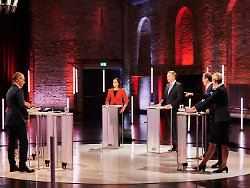Tuesday, September 14, 2021
Four fight in the ARD
Buses, hydrogen and fuel from Chile
By Marko Schlichting
After the triall of the public broadcasters, the Bundestag parties had the floor without a candidate for chancellor on Monday evening. In addition to an interesting coalition request, clear differences between the parties also became apparent. There was a lively discussion on one topic in particular.
The Monday evening after the triall of the public broadcasters was in ARD and ZDF the evening of the parties in the Bundestag that could be considered as small coalition partners. It was already clear beforehand that the Left, FDP, CSU and AFD have different views on many things. The broadcasts on ARD and ZDF were also different. While the second devoted an hour to the four parties in a pre-recorded broadcast, the ARD went live at prime time. And the two moderators, who asked much more critical questions, made sure of that. BR editor-in-chief Christian Nitsche and WDR editor-in-chief Ellen Ehni only failed to get an answer once. Despite five inquiries, CSU regional group leader Alexander Dobrindt eloquently remained silent about whether he had discussed his tax plans with CDU chancellor candidate Armin Laschet.
Dobrindt, the chairmen of the FDP and the left Christian Lindner and Janine Wissler as well as the AFD parliamentary group leader Alice Weidel turned out to be very contentious. For example, Wissler is calling for the retirement age to be lowered to 65 and for the statutory pension to be strengthened. Lindner, on the other hand, would like to change the retirement age so that every employee over 60 can decide for himself when he will retire. In addition, Lindner wants to create a share-financed pension fund. Weidel also calls for a pension fund, which should not only be financed from stocks, but also from funds such as real estate and other resources. Dobrindt attaches great importance to the mother’s pension, an old demand of the CSU. He also knows that there is not enough money in the pension fund, but believes that expected economic growth will compensate for this.
“We have to become technology champions”
The last third of the program really got to the point when it came to climate policy. First of all, Lindner brings the conversation to synthetic fuels. In short, these are fuels that are artificially produced; you don’t need crude oil for their production. For example, hydrogen could be used for this purpose. The manufacturers want to use it to reduce CO2 emissions from cars. This would make them more environmentally friendly.
Disadvantage: The energy required to produce hydrogen is very high, and its production is very expensive. And this is where Lindner believes it has a solution: offshore wind power plants. “We need wind power plants on the coasts that deliver green hydrogen directly,” he says. The “vehicle fleet on the road” must become increasingly climate-friendly. In order for this to happen quickly, he first wants to import synthetic fuels from Chile. The rest of the industry in Germany would take care of itself. “We have to be the pioneer in hydrogen energy,” demands the FDP boss. Dobrindt fully agrees with him and still has a vision: “We can also get out of coal faster.”
The Left has a completely different concept. Wissler wants fewer cars on the road. “It can never be efficient that one and a half tons of sheet metal transport 70 kilograms of people,” she explains. Instead, it demands that local public transport be promoted. Disused railway lines would have to be put back into operation. There should be more buses in the country. Your opinion: “It is not efficient when millions of people are stuck in traffic every day.”
And now it comes to a dispute when Lindner remarks: “But maybe people want to be individually mobile with the car.” Many people don’t even have a choice because many railway lines have been shut down, especially in rural areas, replies Wissler. Lindner explains that many railway lines are simply not worthwhile in the sparsely populated country. And Wissler points out that the rural area is so sparsely populated precisely because there is so little public transport.
Then she turns to the high production costs of hydrogen. Now Lindner is snappy: “Did you suddenly become a scientist?” He asks. Wissler counters: “It would be new to me that you are one.”
Dobrindt sums up the discussion as follows: “I notice that if you choose left or green, you can throw your car key in the urn right away.” Weidel completely stays out of the discussion and at the end says what the AFD wants: “We have to end the German special route.”
The coalition question
When asked about possible coalition partners, the AFD politician also has a simple answer: There is none. It is well known that the left would like to form a government with the SPD and the Greens. Lindner presses around a little, but it becomes clear that he prefers the Union as a partner. Dobrindt, on the other hand, envisages cooperation between the Union, SPD and FDP under certain circumstances. Such a coalition is “sympathetic because it can do without the Greens.” To do this, however, the Union must become stronger again, he says. Because such a government alliance would only come into question for him under the leadership of Armin Laschet.
So what ARD offered on Monday evening was a program that was quite informative. Above all, the viewers were able to experience that election campaigns can also offer real entertainment.
.
